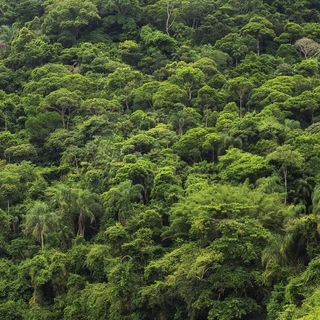This post has been updated since publication to reflect new information.
The Botswana government believes that hundreds of elephants died in the country in July due to ingesting cyanobacteria — a type of bacteria found in the water. 70% of the elephants died near water sources with algal blooms that produced cyanobacteria, according to locals. Scientists believe elephants may have died in such large numbers as they spend lots of time bathing and drinking large amounts of water.
“Our latest tests have detected cyanobacterial neurotoxins to be the cause of deaths. These are bacteria found in water,” Mmadi Reuben, principal veterinary officer at the Botswana department of wildlife and national parks, said according to The Guardian. “However we have many questions still to be answered such as why the elephants only and why that area only. We have a number of hypotheses we are investigating.”
However, conservationists are still not convinced. The Botswana government’ did not preserve and transport tissue samples to ensure accurate testing, which further weakens all new hypotheses for the elephants’ cause of death.
“I hope that what the government has said is true because it rules out some of the more sinister things,” Dr. Niall McCann, director of conservation at U.K. based charity National Park Rescue, told the Guardian. “Just because cyanobacteria were found in the water that does not prove that the elephants died from exposure to those toxins. Without good samples from dead elephants, all hypotheses are just that: hypotheses.”
Related on The Swaddle:
100,000 Mongooses Are Killed in India Each Year so We Can Have Paintbrushes
Local conservationists first spotted 169 dead elephants in a three-hour flight over the Okavango Delta in Botswana. A month later, the total number of dead elephants counted has more than doubled, to around 350, and nobody knows why.
“This is totally unprecedented in terms of numbers of elephants dying in a single event unrelated to drought,” Dr Niall McCann, a biologist with National Park Rescue, told the BBC. The only significant mass death that comes close was during last year’s drought, which killed over 200 elephants in Zimbabwe.
The cause of death remains mysterious, and is dependent upon a post-mortem. Dr Cyril Taolo, acting director for Botswana’s department of wildlife and national parks, told The Guardian that samples from the elephants’ bodies had been sent for testing. He added, “The Covid-19 restrictions have not helped in the transportation of samples in the region and around the world. We’re now beginning to emerge from that and that is why we are now in a position to send the samples to other laboratories.”
Conservationists and the Botswana government have all but ruled out poaching and anthrax poisoning as possible explanations. Poaching was not a viable explanation, as the elephant tusks, which are the prime reasons poachers target elephants, remained untouched. Anthrax poisoning, which previously killed 100 elephants in Botswana occurs due to anthrax bacteria spores naturally found among plants and in soil, and has only tentatively been ruled out. Another potential reason could be poisoning by farmers, as the dead elephants were found close to human habitat. This is because elephants and farmers have long tussled due to the former destroying the latter’s crops.
Related on The Swaddle:
Sixth Mass Extinction Of Wildlife Looms, Warn Scientists
These elephants were seen walking around in circles, suggesting neurological impairment according to McCann. “If you look at the carcasses, some of them have fallen straight on their face, indicating they died very quickly. Others are obviously dying more slowly, like the ones that are wandering around. So it’s very difficult to say what this toxin is,” he told the Guardian.
Conservationists also suspect that the disease or toxins that the elephants are dying from could spread from animals to humans, but there is no way to factually confirm any of these assumptions until lab results are examined.
Over the past seven years, more than 30% of Africa’s unique elephant population has disappeared, mainly due to poaching. A large number of elephants fled to Botswana, due to rampant poaching in neighboring Angola, Zambia and Namibia. These deaths are causing a strain on conservation efforts, as Botswana now contains a third of Africa’s declining elephant population.




